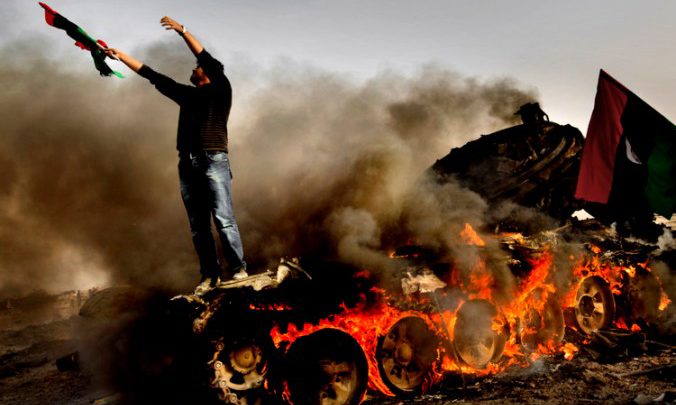Conflict in Libya is one of the most pressing issues of our time. People allover Libya are severely affected by the continuing brutal conflict. There is no doubt about it, the loss of human lives and economic damages are vast. Yes, there is an enormous effort trying to stop or reduce violence and attain stability in the country. Yet, the situation is still chaotic, volatile and even deteriorating in many areas around the country. The ongoing fighting among the opposition groups and especially the Islamist militants (ISIL) is truly an existential threat to Libya and its society. Sadly, the Libyan leaders are extremely divided along regional, political and tribal lines. Helplessly, “The Government of National Accord” (Unity Government), is not able to stop the violence and maintain national order. In essence, the current conflict in Libya is quite complex and unique in its own aspect.
Libya dwells in semi perpetual chaotic-anarchy. There is no strong inclusive national government to prevent violence and maintain stability. This woeful condition gives rise to diverse unpleasant outcomes. It created tensions, disharmony and hostilities among regions, political parties, civil society and tribes. In fact, there are enormous identity issues, regional and tribal polarization, political and socioeconomic complications. Moreover, no single party wants to cede and let its rivals to have ultimate control over their region or tribe. Simply, they do not want be excluded or marginalized by their rivals. They want to be recognized, included and active participants in their country. So, even if there is an imposing peace agreement, there is no guarantee that any excluded group will adhere to it. The possibility of a breach of promises can impede any peaceful settlements even when the settlement would leave all better off.
It is not easy to reach into peace settlement in such complex and inherently divided Libyan societies. Certainly, peace settlement in Libya requires special consideration. It needs constructive plans and methods that lead into inclusive and comprehensive peace agreement. Here, the question: Is inclusive negotiations possible in current disordered environment in Libya? If so, then what are the best options that lead into acceptable agreement by all parties? Given the lack of inclusive unified national government to guarantee the implementation of agreements, what the incentives that encourage the parties to adhere by any agreements that are beneficial for the country’s stability? What features of situations that preclude the possibility to reach into peaceful agreement? What strategies can the international community (mediators) adopt and foster cooperation among the Libyan rival parties? What is the best negotiation strategy to be adapted by the international community for better resolution?
Naturally, there are no simple answers to the questions posted above, but some suggestions can be made. In this respect, we at The Key Group argue that peace in Libya is achievable. We believe that in deeply divided societies as in current Libya, power sharing with inclusive participation is the best alternative for peace settlement. In fact, in this power sharing method, it is essential to include all adversarial parties along with broader civil society in the process. This inclusive and comprehensive participation will be acceptable for all or most parties. Undoubtedly, it will be accepted by political elites, regional representatives, civil society and tribal leaders. Evading inclusive participation, the likely outcomes will be more violence, state collapse and societal disintegration. Thus, it is vital that any successful peace process in Libya must be inclusive and comprehensive. It should include representatives from all regions, political affiliations, civil society and tribal leaders. Of course, the situation of the Islamic militias (ISIL) is a critical factor, and there must be special mechanism on how to deal with it. In short, other than the issue of ISIL, the peace settlement should include all Libyan stakeholders. In this respect, the international community as external neutral body can facilitate, mediate and promote the negotiation process.
Any strong peace settlement requires inclusive engagements by all parties. Indeed, it also needs strong and impartial facilitators and peace mediators. At this point, the mediators should have the leverage to involve and influence all parties to overcome their difference and reach into acceptable peace resolution. In this respect, the international community, indeed, is the best facilitator and mediator. So, it is crucial for the international community to take a decisive measure and action to help the Libyan parties to negotiate a comprehensive peace agreement. The mediation task should be multilateral and includes countries such as the US, Canada, the EU countries, some of the Arab, African and Asian countries. Also the process should include regional and international organizations such as the UN, African Union, EU, the Arab League and other related organizations.
It is indubitable fact, the international community is doing a great work to stop violence in Libya and reach into peace settlement in the country. This humane goal is notably inspired and highly supported by many peace loving people. Yet, and so far, the attempt is less successful. It is obvious that there is an apparent disproportion between the assiduously efforts and the outcome. As a result, there is a sufficient reason for the Libyan stakeholders and the international community alike to look for other alternatives. The chosen alternative should be feasible, workable and acceptable for all parties. Thus, the alternative should be inclusive power sharing that will incorporate all the stakeholders.
It is true, the pervasiveness violent conflict in Libya is regrettable. In a way, the conflict in Libya is political. In this sense, the conflict is constructed, polarized and manipulated by political elites, regional and tribal leaders. In some respects, these elites and leaders foster discrimination, negative mobilization and polarization against their rivals. Therefore, the peace settlement should be inclusive and internal among all stakeholders. The international community should facilitate, monitor the negotiations and grantee the outcome agreement. So power sharing and inclusive representation is vital to bring peace and stability in deeply divided contemporary Libya.
Power sharing is the best alternative to overcome the heated conflict in Libya. In power sharing process, everyone will feel included in the discussion, their interests being considered and participate in the decision making of their country’s future. In fact, the inclusive participation under the theme of power sharing will reduce violence, group proliferation and polarization and brings the divided Libyans together. Most importantly, the process will enable a broader representations and coalitions among the regions, political parties, civil society and tribal leaders. In short, a unified inclusive negotiation framework under the umbrella of power sharing will create conducive environment for productive outcome.
In the current conflict in Libya, there is no victory or defeat, but only violence and human destruction. So, it is time to stop the ongoing violence in Libya and by all means possible. Yes, it is time for peace settlement and political stability allover the country. This is feasible and achievable. It is evident that the international community will constructively facilitate and mediate the peace settlement among the divided parties. The international community as trusted mediator and with it rich experience can persuade the parties for best peace settlement. Moreover, the international community cam move further and offer formulas and options for acceptable settlement. In addition to offering formulas and options, the mediators also should influence the parties by employing incentives and disincentives (carrots and sticks) to encourage parties to end violence and negotiate effectively. To put it differently, the mediators should determine the inducements that will lead the rival parties to reach into an agreement that is legitimate and acceptable to them and to the international community.
In a nutshell, it is enough of the human destruction in Libya. With all confidence, peace settlement in Libya is feasible and achievable. Without doubt, the Libyan people are able to energize their courage, strong will and confidence to overcome their differences and reach into peaceful power sharing resolution. This power sharing peace resolution will be by Libyans and for Libyans, and for sure will ensure an enduring peace and stability. The Libyan people deserve security, political and socioeconomic stability and decent life. This is a sufficient reason that should motivate all parties to incorporate all their efforts to build better Libya and for all. This is not an impossible endeavor. In fact, it is achievable via inclusive power sharing that incorporates all Libyan stakeholders. It is the right time to realize peace and stability in Libya.

